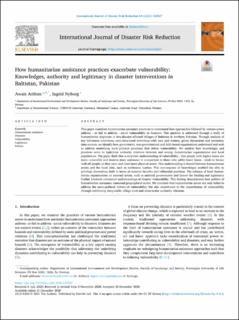How humanitarian assistance practices exacerbate vulnerability: Knowledges, authority and legitimacy in disaster interventions in Baltistan, Pakistan
Peer reviewed, Journal article
Published version
Permanent lenke
https://hdl.handle.net/11250/2831067Utgivelsesdato
2021Metadata
Vis full innførselSamlinger
Originalversjon
International Journal of Disaster Risk Reduction. 2021, 54 (102027), . 10.1016/j.ijdrr.2020.102027Sammendrag
This paper examines humanitarian assistance practices to understand how approaches followed by various actors address – or fail to address - social vulnerability to disasters. This question is addressed through a study of humanitarian responses in two disaster-affected villages of Baltistan in northern Pakistan. Through analysis of key informant interviews, semi-structured interviews with men and women, group discussions and secondary data sources, we identify how government, non-governmental and faith-based organisations understand and seek to address underlying socio-political processes that define vulnerability. We analyse how knowledges and practices serve to legitimise authority relations between and among humanitarian organisations and local populations. The paper finds that a simplistic understanding of vulnerability - that people with higher losses are more vulnerable and deserve more assistance in comparison to those who suffer lower losses - tends to favour well-off people, as they own (and lose) more physical assets. This understanding is shared between humanitarian actors and the local elite, such as settlement leaders. This convergence of knowledges enabled the elite to privilege themselves, both in terms of material benefits and influential positions. The reliance of local humanitarian organisations on external actors, such as national governments and donors for funding and legitimacy further hindered contextual understandings of disaster vulnerability. This finding demonstrates how politics of humanitarian assistance transcend geographical scales. We conclude that humanitarian actors not only failed to address the socio-political drivers of vulnerability but also contributed to the exacerbation of vulnerability through reinforcing inequitable village-level and cross-scalar authority relations.
